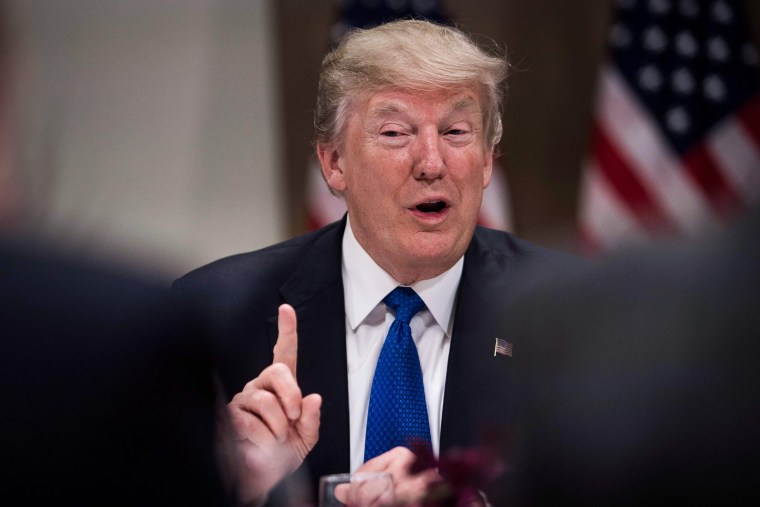The Washington Post reported yesterday morning that Congress has several competing options on gun policy, but what lawmakers are looking for is some presidential leadership.
Donald Trump and his team have pointed in a series of different directions, and as the article added, lawmakers are "searching for signals from the administration on how it wants Congress to respond to the Feb. 14 shooting and how serious Trump is about the various proposals he has floated in the days since 17 people were gunned down at Marjory Stoneman Douglas High School in Parkland, Fla."
I think it's safe to say that if everyone was uncertain about how to proceed before, they're even more confused now.
President Donald Trump said Wednesday that his administration was drafting an executive order that would ban rapid-fire gun bump stocks and appeared to embrace a series of gun-control measures that his party has long rejected. During an extraordinary hour-long discussion on school safety at the White House, his free-wheeling positions on guns appeared to startle several members of a bipartisan group of lawmakers.Cameras were allowed in to capture Trump's negotiations with key members of Congress in real time, where he chastised some in attendance for being too "afraid" of the National Rifle Association to take action after past mass shootings and positioned himself as the person to finally herald legislation that could tighten America's background checks system.
Even for those who've come to expect baffling displays from this president, yesterday's televised discussion was truly bizarre. The House Republicans' bill tying background checks to concealed carry? Trump is now against it, and lectured GOP lawmakers about its futility. The 2013 Manchin-Toomey bill? He didn't seem to know what it was. The National Rifle Association? Trump initially bragged about his undying affection for the far-right organization, shortly before mocking lawmakers for being beholden to the advocacy group.
At one point, when the discussion turned to Americans who've been flagged as potentially dangerous, the president endorsed an approach in which law enforcement could confiscate firearms without due process.
"Take the guns first, go through due process second," Trump said. He was responding to a comment from his own vice president, Mike Pence, about requiring the police to get court orders.
We were left with an NRA-backed Republican president who wants expanded background checks, gun confiscations, raised age limits, and quite possibly an assault-weapons ban.
It was like watching a conservative nightmare come to life, except for one nagging detail: it's quite likely that nothing Trump said mattered.
To be sure, Republicans were understandably apoplectic after the White House meeting wrapped up. Some GOP lawmakers literally couldn't believe what they'd just heard from their own party's president. But one unnamed Republican staffer told the Weekly Standard, “This is why you don’t do high-stakes, hot-button negotiation on live TV with someone who doesn’t know or care about details.”
And therein lies the point. As ridiculous as this may sound, there's no practical value to having policy discussions with Donald Trump because he simply doesn't know or care what he's talking about at any given moment. In fact, not only does this president not really speak for his own administration, there's no reason to believe Trump or his team will stand by any of the things he said yesterday.
Indeed, few would be surprised if the president started pretending he never made these televised comments, dismissing the whole story as "fake news."
Worse, this isn't an especially new dynamic. During the immigration debate, for example, Trump hosted an eerily similar meeting in the same Cabinet Room, endorsed all kinds of progressive goals, and then promptly pursued the opposite priorities. It reached the point that Republican officials insisted that the president not negotiate directly with Democrats, for fear that he might be "tricked" into endorsing proposals he's not supposed to like.
The same was true during last year's drama over health care, when it was an open secret that Republicans were terrified of the prospect of Trump negotiating directly with Democratic leaders. The fear, of course, was that the amateur president would sit down Nancy Pelosi and Chuck Schumer, he’d find their pitch compelling; and Trump would end up giving Dems everything they asked for.
The president has time to prepare for these meetings -- perhaps putting his "executive time" to good use -- and brush up on the relevant details. He simply chooses not to. Maybe Trump's lazy. Perhaps he struggles to understand the information presented to him. Maybe he just doesn't care and finds anything that interrupts his television habits annoying.
Whatever the cause, in order for a president to negotiate meaningful policy outcomes in good faith, he'd have to have some basic understanding of what he's doing. Donald Trump doesn't.
